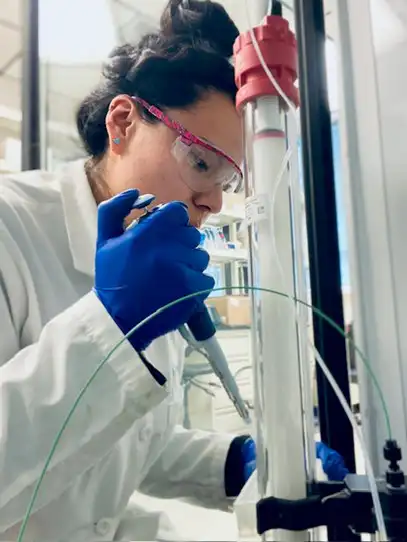From Curiosity to Contribution: Amalia Parra's Journey in Molecular Genetics and National Security
Meet Amalia Parra

As a participant in the Intelligence Community (IC) Postdoctoral Program, Amalia Parra investigates gene networks in Drosophila melanogaster to enhance U.S. national security through improved threat detection and mitigation. (Photo Credit: Amalia Parra)
In a serendipitous twist of fate, Amalia Parra’s, Ph.D., journey into the realm of STEM began unexpectedly but quickly turned into a passionate pursuit. From her initial fascination with the hands-on nature of scientific inquiry to the exhilaration of designing research questions and experiments, Parra found herself captivated by the challenge and excitement of discovery. This early curiosity would shape her academic and professional path, leading her to make significant contributions to the field of molecular genetics.
Parra’s educational foundation was built at the University of New Mexico, where she earned degrees in Law (B.A.), Molecular Biology (B.Sc.), and Interdisciplinary Studies in 2016. Her pursuit of knowledge continued with a doctoral degree in Molecular Genetics in 2021, followed by a postdoctoral fellowship in Chemical Biology from 2022 to 2024. This extensive academic background laid the groundwork for her subsequent endeavors in synthetic biology and national security.
Motivated by a desire to conduct impactful research, Parra joined the Intelligence Community (IC) Postdoctoral Research Fellowship Program in Albuquerque, New Mexico, funded by the Office of the Director of National Intelligence (ODNI).
The IC Postdoctoral Research Fellowship Program was established in 2000 to support unclassified basic research in areas of interest to the IC. The Program annually supports several Postdoctoral Fellows (Postdocs) from U.S. accredited colleges, universities, and U.S. Government laboratories across the country.
Under the mentorship of Christopher Johnston, Ph.D., Parra embarked on a two-year journey that began in October 2022 and concluded in September 2024. She was drawn to the program by the opportunity to engage in basic research relevant to the intelligence community while advancing her career development.
Parra’s research at the Department of Biology in the Christopher Johnston Laboratory focuses on the genetic mechanisms underlying responses to various environmental factors using Drosophila melanogaster, commonly known as fruit flies. These organisms, with their highly modifiable and well-annotated genomes, provide a valuable model for understanding gene networks and biological responses. “The fruit fly is an ideal system for studying genetic responses because many of its genes and pathways are conserved in humans,” Parra explains.
Her research aims to identify gene networks that inform responses to chemical hazards posing biological threats to U.S. national security. By coordinating protein function, metabolic pathways, and epigenetic regulation, Parra’s work provides a comprehensive understanding of biological responses to these threats. This research not only advances scientific knowledge but also enhances the U.S.’s strategic capabilities in detecting and mitigating biological threats. “Our findings will help improve threat detection and provide new avenues for understanding life at a genetic level,” Parra notes.
A typical day for Parra involves meticulous care of laboratory flies, conducting experiments, collecting and sorting samples, and engaging with students on research plans. She also manages administrative and financial duties, offering her a holistic view of running a research laboratory. This blend of technical and managerial experience has equipped her with a unique skill set that will serve her well in future roles. “I’ve learned that being a scientist involves much more than just running experiments. The leadership and management skills I’ve gained will be invaluable as I pursue my goal of becoming a Principal Investigator,” she reflects.
Parra’s dedication to her field is evident in her participation in conferences and her contributions to scientific literature. She presented her research on the “Epigenetic Regulation of Neural Stem Cell Function in Response to Environmental Toxicants” at the IC Postdoctoral Fellowship annual TechWeek in McLean, Virginia in September 2023. She is also the lead author of a manuscript that will soon be submitted to a leading scientific journal for publication.
Looking ahead, Parra remains committed to conducting research and driving innovation in molecular genetics and synthetic biology. “My goal is to continue conducting research as a Principal Investigator, leveraging my experience to advance scientific discovery and national security,” she shares. Her journey, marked by curiosity, dedication, and resilience, underscores the transformative potential of scientific inquiry in shaping a safer and more knowledgeable future.
Amalia Parra’s story is a testament to the power of unexpected beginnings and the impact of relentless pursuit of knowledge. As she continues to contribute to the field of molecular genetics, her work exemplifies the vital role of scientific research in addressing some of the most pressing challenges of our time.

